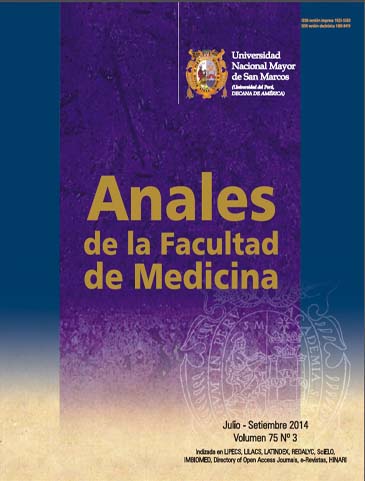Perception of students of medicine of a public university on the elderly professor and the elderly citizen
DOI:
https://doi.org/10.15381/anales.v75i3.9777Keywords:
Elderly, medical students, perceptions.Abstract
Introduction: Most available studies show that youngsters’ perception on old age is usually negative. Aim: To analyze the perception of Universidad Nacional Mayor de San Marcos’ medical students on old age, and to analyze the presence of negative stereotypes towards old age and elder teachers’ faculties. Design: Cross-sectional study. Location: Faculty of Medicine, Universidad Nacional Mayor de San Marcos, Lima, Peru. Participants: First, third and fifth year medical students. Interventions: A self-administered questionnaire using a semantic differential scale to determine student’s perception of the elderly was applied. Main outcome measures: Perception of the elder teachers’ faculties and the elderly. Results: From the 319 students sampled 54.2% were male and mean age was 21.7± 2.6 years old; 90.3% had proximity to teachers older than 70. Fifth year students gave lower scores for both elder teachers (p=0.003) and older adults (p=0.045). Students living with persons older than 70 in their families had a more positive perception on older adults (p=0.037). In regards to older teachers, five characteristics obtained a perception score over 70%: self security (78%), organized (73.9%), interest in students’ learning (72.8%), planning (72.6%), and emotional stability (71.8%). Regarding the elder in general, scores did not reach 70%, and they were characterized as tractable, sociable and skillful. Conclusions: Medical students showed a positive perception of elder teachers and elderly in general. There were statistically significant differences by year of studies. Students that lived with elder people had a more favorable perception on both old age and elder teachers, as compared with those who did not have such experience.Downloads
Published
2014-09-15
Issue
Section
Trabajos originales
License
Copyright (c) 2014 Martha Martina, César Gutiérrez, Miluska Mejía, Ricardo Terukina

This work is licensed under a Creative Commons Attribution-NonCommercial-ShareAlike 4.0 International License.
Those authors who have publications with this magazine accept the following terms:
- Authors will retain their copyrights and guarantee the journal the right of first publication of their work, which will be simultaneously subject to Creative Commons Attribution License that allows third parties to share the work as long as its author and its first publication this magazine are indicated.
- Authors may adopt other non-exclusive licensing agreements for the distribution of the version of the published work (eg, deposit it in an institutional electronic file or publish it in a monographic volume) provided that the initial publication in this magazine is indicated.
- Authors are allowed and recommended to disseminate their work over the Internet (eg: in institutional telematic archives or on their website) before and during the submission process, which It can produce interesting exchanges and increase quotes from the published work. (See El efecto del acceso abierto ).
How to Cite
1.
Martina M, Gutiérrez C, Mejía M, Terukina R. Perception of students of medicine of a public university on the elderly professor and the elderly citizen. An Fac med [Internet]. 2014 Sep. 15 [cited 2024 Jul. 17];75(3):237-44. Available from: https://revistasinvestigacion.unmsm.edu.pe/index.php/anales/article/view/9777















